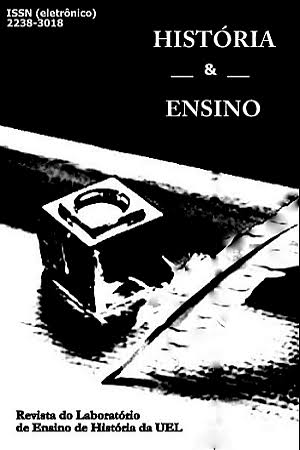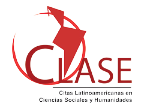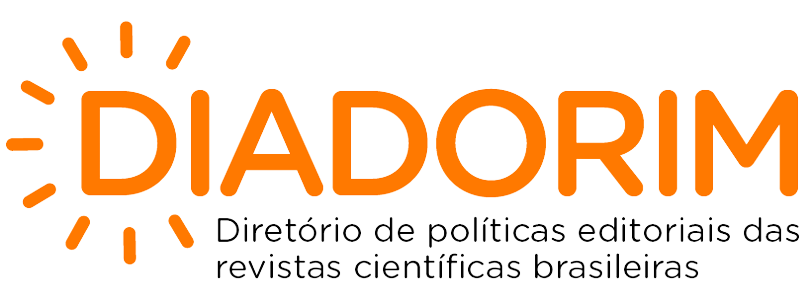Military dictatorship narrated in the history textbooks
DOI:
https://doi.org/10.5433/2238-3018.2019v25n2p217Keywords:
Military Dictatorshi, Textbooks, Historical narrativeAbstract
This text presents partial results of the research in development on the Program of Scientific Initiation - PIBIC of the Federal University of Mato Grosso - UFMT, whose objective is to analyze the historical narratives about the coup and the Military Dictatorship in Brazil in the History textbooks approved by the National Program of Didactic Book - PNLD. The specific objectives of this work were: a) To carry out a bibliographic review about the coup and the Military Dictatorship in Brazil; b) To inventory the History textbooks for Elementary School approved by PNLD; c) Analyze three History textbooks approved by PNLD 2017. The collections History, Society & Citizenship (2015), Araribá - História (2015) and Will to Know (2015) were analyzed. In the analysis, we assumed as theoretical-methodological reference the model of scientific criticism of the historical interpretation presented in textbooks and the typologies of historical narratives proposed by Rüsen (2010). The critique model is based on a set of criteria for the analysis of the textbook. We chose to analyze the criteria of presentation of historical materials (texts), plurality of historical experience, pluriperspectivity and scientific norms as essential for the narrative development of textbooks. Thus, we tried to identify the presence of the typologies of historical narrative: traditional (affirmation), exemplar (regularity), criticism (negation) and genetics (transformation). Partial results allowed us to observe the absence of historiographical texts in the presentation of historical materials. The predominance of politics as the scope of experience and the inexistence of the various perspectives of history. However, there is a reasonable adoption of scientific norms as far as historiography is concerned. We understand that the absence of the analyzed criteria is closely related to the predominance of the traditional historical narrative present in the textbook analyzed.Downloads
Download data is not yet available.
References
ALMEIDA, Sabrina Basílio de; RODRIGUES JUNIOR, Osvaldo Rodrigues. A falsificação da história no livro didático História do Brasil: Império e República. In: Mnemosine revista, volume 7, nº 4, out/dez 2016, p. 221- 234.
APOLINÁRIO, Maria Raquel (ed.). Araribá: história: 9º ano. São Paulo: Moderna, 2015. BOULOS JUNIOR, Alfredo. História, Sociedade & Cidadania: 9º ano. São Paulo: FTD, 2015.
DIAS, Adriana; GRINBERG, Keila; PELLEGRINI, Marco. Vontade de Saber: história: 9º ano. São Paulo: FTD, 2015.
FICO, Carlos. Versões e controvérsias sobre 1964 e a ditadura militar. Revista Brasileira de História, São Paulo, v. 24, n. 47, p. 29-60, 2004.
FICO, Carlos. Ditadura militar brasileira: aproximações teóricas e historiográficas. Revista Tempo e Argumento, Florianópolis, v. 9, n. 20, p. 5-74, jan./abr. 2017.
FICO, Carlos. História do Brasil contemporâneo. São Paulo: Contexto, 2015.
MUNAKATA, Kazumi. História que os livros didáticos contam, depois que acabou a ditadura. In: FREITAS, Marcos Cezar (org.). Historiografia brasileira em perspectiva. São Paulo: Contexto, 1998. p. 271-290.
GASPARI, Elio. A ditadura derrotada. São Paulo: Cia das Letras, 2003. (As ilusões armadas, v. 3).
GOMES NETO, Manoel; PATRÍCIO, Viviane Edna Vieira; AQUINO, Viviane de Fátima; SOUZA, Wellerson Almeida de. A ditadura militar e o ensino de história: livro didático durante e depois do golpe de 1964. In: ENCONTRO DE INICIAÇÃO À DOCÊNCIA DA UNIVERSIDADE ESTADUAL DA PARAÍBA, 4., 2014, João Pessoa. Anais [...]. João Pessoa: UEPB, 2014. REIS, Tiago Felipe; PRADO, Eliane Mimese. A ditadura militar brasileira em determinados manuais didáticos da educação básica. Revista Intersaberes, [São Paulo], v. 7, n. 14, p. 278-290, ago./dez. 2012.
REIS, Daniel Aarão. Ditadura e democracia no Brasil: do golpe de 1964 à Constituição de 1988. Rio de Janeiro: Zahar, 2014.
ROCHA, Aristeu Castilhos. O regime militar no livro didático de história do ensino médio: a construção de uma memória. 2008. Tese (Doutorado em História) - Pontifícia Universidade Católica do Rio Grande do Sul, Porto Alegre, 2008.
ROCHA, Helenice. A ditadura militar nas narrativas didáticas. In: ROCHA, Helenice; REZNIK, Luis; MAGALHÃES, Marcelo de Souza (org.). Livros didáticos de história: entre políticas e narrativas. Rio de Janeiro: FGV Editora, 2017. p. 245-263.
RODEGHERO, Carla Simone; MACHADO, Vanderlei. A história recente nos livros didáticos: a ditadura militar e a questão da anistia no Brasil. Cadernos do Aplicação, Porto Alegre, v. 23, n. 1, p. 165-195, jan./jun. 2010
RÜSEN, Jörn. Jörn Rüsen e o ensino de História. Curitiba: Editora da UFPR, 2010.
SCHRÖDER, Janice Roberta; MASIERO, Claudia Gisele. Livros didáticos e abordagens sobre o período de ditadura civil-militar no Brasil. In: SEMINÁRIO DE ESTUDOS HISTÓRICOS, 11., 2013, Novo Hamburgo. Anais [...]. Novo Hamburgo: Feevale, 2013. p. 1-19.
SILVEIRA, Danielle Rodrigues. História do tempo presente e livro didático: os sujeitos da Ditadura Militar nos livros didáticos de História. In: SIMPÓSIO NACIONAL DE HISTÓRIA, 28., 2015, Florianópolis. Anais [...]. Florianópolis: UFSC, 2015. p. 2 -11
APOLINÁRIO, Maria Raquel (ed.). Araribá: história: 9º ano. São Paulo: Moderna, 2015. BOULOS JUNIOR, Alfredo. História, Sociedade & Cidadania: 9º ano. São Paulo: FTD, 2015.
DIAS, Adriana; GRINBERG, Keila; PELLEGRINI, Marco. Vontade de Saber: história: 9º ano. São Paulo: FTD, 2015.
FICO, Carlos. Versões e controvérsias sobre 1964 e a ditadura militar. Revista Brasileira de História, São Paulo, v. 24, n. 47, p. 29-60, 2004.
FICO, Carlos. Ditadura militar brasileira: aproximações teóricas e historiográficas. Revista Tempo e Argumento, Florianópolis, v. 9, n. 20, p. 5-74, jan./abr. 2017.
FICO, Carlos. História do Brasil contemporâneo. São Paulo: Contexto, 2015.
MUNAKATA, Kazumi. História que os livros didáticos contam, depois que acabou a ditadura. In: FREITAS, Marcos Cezar (org.). Historiografia brasileira em perspectiva. São Paulo: Contexto, 1998. p. 271-290.
GASPARI, Elio. A ditadura derrotada. São Paulo: Cia das Letras, 2003. (As ilusões armadas, v. 3).
GOMES NETO, Manoel; PATRÍCIO, Viviane Edna Vieira; AQUINO, Viviane de Fátima; SOUZA, Wellerson Almeida de. A ditadura militar e o ensino de história: livro didático durante e depois do golpe de 1964. In: ENCONTRO DE INICIAÇÃO À DOCÊNCIA DA UNIVERSIDADE ESTADUAL DA PARAÍBA, 4., 2014, João Pessoa. Anais [...]. João Pessoa: UEPB, 2014. REIS, Tiago Felipe; PRADO, Eliane Mimese. A ditadura militar brasileira em determinados manuais didáticos da educação básica. Revista Intersaberes, [São Paulo], v. 7, n. 14, p. 278-290, ago./dez. 2012.
REIS, Daniel Aarão. Ditadura e democracia no Brasil: do golpe de 1964 à Constituição de 1988. Rio de Janeiro: Zahar, 2014.
ROCHA, Aristeu Castilhos. O regime militar no livro didático de história do ensino médio: a construção de uma memória. 2008. Tese (Doutorado em História) - Pontifícia Universidade Católica do Rio Grande do Sul, Porto Alegre, 2008.
ROCHA, Helenice. A ditadura militar nas narrativas didáticas. In: ROCHA, Helenice; REZNIK, Luis; MAGALHÃES, Marcelo de Souza (org.). Livros didáticos de história: entre políticas e narrativas. Rio de Janeiro: FGV Editora, 2017. p. 245-263.
RODEGHERO, Carla Simone; MACHADO, Vanderlei. A história recente nos livros didáticos: a ditadura militar e a questão da anistia no Brasil. Cadernos do Aplicação, Porto Alegre, v. 23, n. 1, p. 165-195, jan./jun. 2010
RÜSEN, Jörn. Jörn Rüsen e o ensino de História. Curitiba: Editora da UFPR, 2010.
SCHRÖDER, Janice Roberta; MASIERO, Claudia Gisele. Livros didáticos e abordagens sobre o período de ditadura civil-militar no Brasil. In: SEMINÁRIO DE ESTUDOS HISTÓRICOS, 11., 2013, Novo Hamburgo. Anais [...]. Novo Hamburgo: Feevale, 2013. p. 1-19.
SILVEIRA, Danielle Rodrigues. História do tempo presente e livro didático: os sujeitos da Ditadura Militar nos livros didáticos de História. In: SIMPÓSIO NACIONAL DE HISTÓRIA, 28., 2015, Florianópolis. Anais [...]. Florianópolis: UFSC, 2015. p. 2 -11
Downloads
Published
2019-12-01
How to Cite
Rodrigues Junior, O., & Seba, L. (2019). Military dictatorship narrated in the history textbooks. História & Ensino, 25(2), 217–237. https://doi.org/10.5433/2238-3018.2019v25n2p217
Issue
Section
Artigos
License
História & Ensino adota a licença CC-BY esta licença permite que os reutilizadores distribuam, remixem, adaptem e criem a partir do material em qualquer meio ou formato, desde que a atribuição seja dada ao criador. A licença permite o uso comercial.















